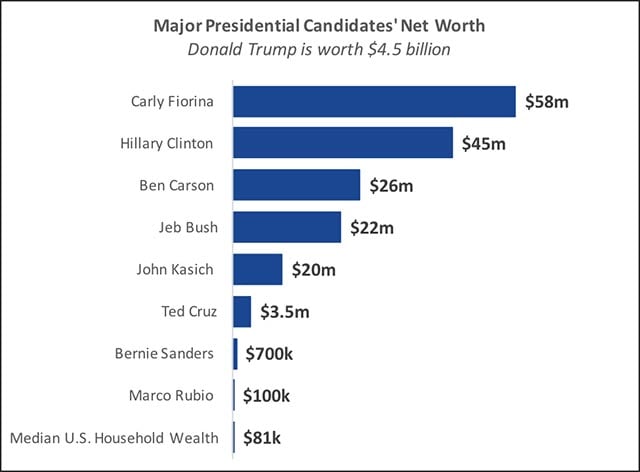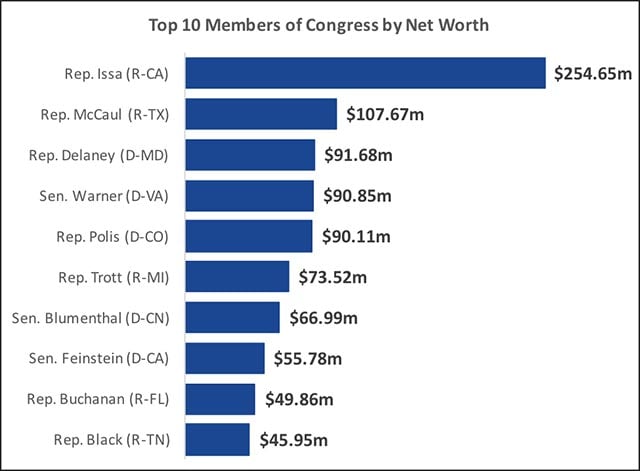
In the lead-up to his New Hampshire primary victory, Senator Bernie Sanders boosted his public support by blasting Hillary Clinton’s lucrative ties to Wall Street.
This public concern over Clinton’s relationship with the financial industry speaks to more than the issue of campaign contributions. Average Americans are worrying today about the power and influence wealthy Americans, especially wealthy white males, have over the political class. Our political leaders themselves too often appear to be part of this same white male economic elite.
The 2016 presidential candidates may be more diverse by race, gender, and class than candidates in the past. But that’s not saying much. According to Forbes, six of the remaining 10 major contenders have fortunes worth at least $20 million. Trump, with his $4.5 billion stash, sits off the charts. Outside of Sanders and Senator Rubio, every candidate in the top tier has a personal fortune worth at least $3 million.
 Source: Agustino Fontevecchia, “Forbes’ 2016 Presidential Candidate Wealth List.“
Source: Agustino Fontevecchia, “Forbes’ 2016 Presidential Candidate Wealth List.“
The wealth gap between the presidential candidates and average Americans could hardly be more stark. According to the IPS report Billionaire Bonanza: The Forbes 400 and the Rest of Us, the median American household has only $81,400 in wealth.
The gap becomes even more pronounced when we consider race: The median black household holds a mere $11,000 in assets, while Latino households have only $13,700.
The U.S. Congress is even more homogenous than the presidential field. Males currently comprise a whopping 80 percent of both chambers, and whites make up 80 percent of House members and 94 percent of senators. And yet this body has traditionally been so overwhelmingly white and male that the Washington Post touted the current 114th Congress as “one of the most diverse in American history.”
Open Secrets puts the median wealth of a member of Congress at over $1 million. Compared to the richest members, this median seems paltry. For example, Rep. Darrell Issa, former chair of the House Oversight and Government Reform Committee, is sitting on $254 million in personal assets.
The richest members of Congress display rather aptly the racial and gender disparities we see in our broader U.S. society. According to Roll Call’s annual “Wealth of Congress Index,” the top 10 wealthiest members of Congress are all white. With the exception of Sen. Dianne Feinstein and Rep. Diane Black, the top 10 wealthiest members of Congress are all male.
 Source: “Wealth of Congress Index,” November 2015.
Source: “Wealth of Congress Index,” November 2015.
Our representative democracy originates from the idea that electing those who reflect the values and lives of their constituency is a virtue. Our current lack of diverse representation removes the voices of everyday Americans from the political discourse, losing valuable insights that would uplift life for all.
Encouraging greater voter turnout and political participation would be only one solution. We also need campaign finance reform to limit the influence of money in politics and strip the wealthiest classes of their disproportionate political clout.
The Sanders and Rubio candidacies prove that we can have viable non-millionaire presidential candidates, but the overall state of wealth in politics heavily disenfranchises those of modest means, especially women and people of color.
Many progressive organizations have come together to support Democracy Awakening, a series of mobilizations in Washington, D.C. this April and May that will hopefully lead to a greater commitment to increase the diversity of our political class by limiting the power of money and wealth in politics.
With a more level playing field, we would have a greater number of people of color, women, and Americans of all income and wealth levels running for office – and having their voices heard.
Join us in defending the truth before it’s too late
The future of independent journalism is uncertain, and the consequences of losing it are too grave to ignore. To ensure Truthout remains safe, strong, and free, we need to raise $33,000 in the next 2 days. Every dollar raised goes directly toward the costs of producing news you can trust.
Please give what you can — because by supporting us with a tax-deductible donation, you’re not just preserving a source of news, you’re helping to safeguard what’s left of our democracy.